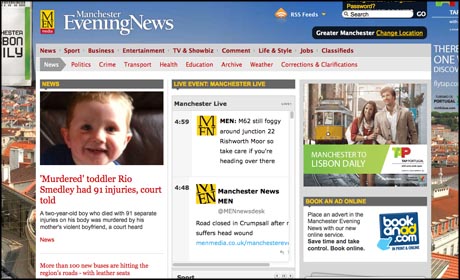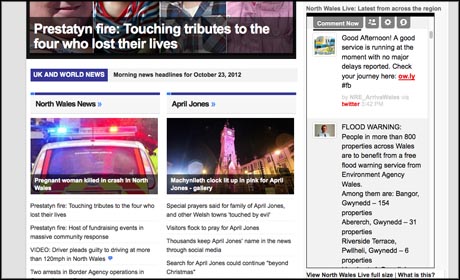
Earlier this month the websites for Manchester Evening News and the Daily Post in North Wales launched new liveblogs on their homepages, which are being run throughout the day.
The liveblogs, which are currently being run by CoverItLive on MEN's website and ScribbleLive on the Daily Post's website, offer a daily feed of the latest news and information updates from the newsrooms.
It is part of an experiment by Trinity Mirror regionals as part of a bid to place a "new emphasis on breaking news", digital publishing director David Higgerson told Journalism.co.uk.
"One of the things that came back from user research was that they weren't aware of how often we were updating the site and that also they didn't necessarily always want the full packaged piece of content, which is what we're traditionally good at as we are newspaper newsrooms," he said.
"So a group of us worked together, including Alison Gow, who's now the editor of the North Wales Daily Post, and Sarah Lester, who's the executive editor of digital in Manchester, and we built the idea up of creating something which put a new emphasis on breaking news, and that in turn puts a new emphasis on breaking news in the newsroom as a whole and it was a case that we wanted to try it in two very different centres.
"We wanted to try it in one of our big city titles, which is Manchester, and also try it in one of our more rural, smaller centres. It felt right for it to be the Daily Post in North Wales."

Screenshot of Manchester Evening News's liveblog

Screenshot of North Wales Daily Post's liveblog
Operation of the liveblogs, which are run and monitored from early in the morning until around 10pm at night, is generally taken on first by a reporter who will file initial information such as traffic news or police voicebank updates in the morning.
"If it's something that's worth more than that they'll then write a few paragraphs for the website, file the story then link to the story from the liveblog," Higgerson explained. Bigger stories may be passed to another reporter to develop during the day for print and online.
"It very much falls to the one reporter who's doing the calls and monitoring social media to be on the lookout for stuff, but it's something that involves the whole newsroom", in terms of making sure it remains updated, he said.
While the team in North Wales also run the liveblog over the weekend, Manchester currently does not, although it did activate it on Sunday in relation to an event which occurred in the city centre, Higgerson said.
"The response to them activating on a Sunday was just very positive and certainly we've set it up so we can instantly go back into it should something huge break, but at the same time if nothing is happening it can sit there quietly during the quieter periods of the day."
If a single event is providing very frequent updates it may be moved to its own liveblog, he said, with key information pushed through the newsroom-wide blog instead.
"We don't think they will particularly want to be inundated with stuff from one particular event, so if there is one particular event taking place we will open up another liveblog.What it's shown so far is the pages per user on both sites is going upDavid Higgerson
"It's just striking that balance in the way most news organisations have to do about making sure we're serving the means of the audience that want not so much the detail, and we can do that in one place, but then we can just give people an overview somewhere else and point them to the more detailed content."
He said so far audiences seem to like the experiment. There are a number of ways success is being measured, from time spent on the homepage and page impressions to return visits and pages viewed per user.
"Time spent on homepage is important. We also serve the liveblog within an article as well so it's drawing people in through search and that's the thing we tend to link to from social media, so we monitor the page impressions on that.
"We also are looking at return visits during the course of the day, we're refining that metric, we're not entirely there with that yet, but what it's shown so far is the pages per user on both sites is going up.
"Pages per user is never something that leaps massively but we are seeing that people are clicking on the links we're putting inside the liveblog and moving around the site more. We also feel we're getting more interactivity from people, people reacting to stuff."
He added that as well as the introduction of the new liveblog, the North Wales Daily Post newsroom has also started using Spundge as a new research tool. Spundge launched last month and can be used by journalists to collect, curate and publish content from the web.
"That's made a huge difference, you've got a breaking news reporter monitoring the wires, doing the calls but they've also got Spundge operating on search terms from all the various sites and that's making a big difference.
"It's picked up several stories for them already so it's really nice when you see a new tool come out that you can start using straight away and makes such a brilliant impact and difference to the newsroom straight away."
Free daily newsletter
If you like our news and feature articles, you can sign up to receive our free daily (Mon-Fri) email newsletter (mobile friendly).
Related articles
- 'Audiences are making a rational decision not to consume news products'
- Gina Chua, executive editor of Semafor, on a new brand of transparent journalism
- Where does virtue signalling belong in digital journalism?
- How the covid pandemic changed digital journalism
- Newsquest experiments with audio to boost audience engagement and subscriptions









